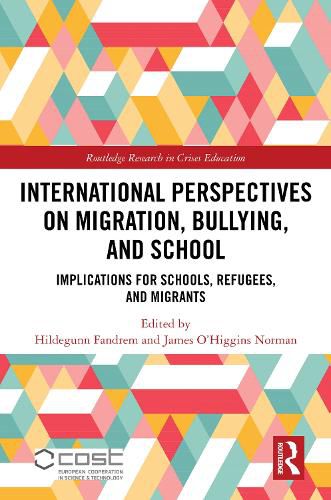Readings Newsletter
Become a Readings Member to make your shopping experience even easier.
Sign in or sign up for free!
You’re not far away from qualifying for FREE standard shipping within Australia
You’ve qualified for FREE standard shipping within Australia
The cart is loading…






This edited volume consolidates research from 32 countries in order to address the implications of the recent global wave of migration on educational opportunity and assess links between migration and bullying in Europe and further afield.
Using data gathered from the European Commission-funded TRIBES project (Transnational Collaboration on Bullying, Migration, and Integration at School Level), chapters cover first-hand accounts, policy document analysis, and lived experience through comparative themes such as school climate, governmental policy, diversity and inclusion, technology, student voice, and school design to demonstrate how bullying can be understood as a threat to developing inclusive and diverse schools and societies globally. Rooted in a bio-ecological model that recognizes the intersectionality of migrant lives, ultimately this book will advance collaboration between stakeholders to ensure better integration, a reduction in bullying, and better safety and well-being for refugee and migrant students.
Reflecting the truly cross-disciplinary, cross-cultural, and intersectional nature of the volume, this book will be of interest to researchers, scholars, and postgraduate students in migration and education studies, bullying and cyberbullying, and the sociology of education. Policymakers and practitioners in psychology, technology, and youth studies more broadly will also benefit from this book.
$9.00 standard shipping within Australia
FREE standard shipping within Australia for orders over $100.00
Express & International shipping calculated at checkout
Stock availability can be subject to change without notice. We recommend calling the shop or contacting our online team to check availability of low stock items. Please see our Shopping Online page for more details.
This edited volume consolidates research from 32 countries in order to address the implications of the recent global wave of migration on educational opportunity and assess links between migration and bullying in Europe and further afield.
Using data gathered from the European Commission-funded TRIBES project (Transnational Collaboration on Bullying, Migration, and Integration at School Level), chapters cover first-hand accounts, policy document analysis, and lived experience through comparative themes such as school climate, governmental policy, diversity and inclusion, technology, student voice, and school design to demonstrate how bullying can be understood as a threat to developing inclusive and diverse schools and societies globally. Rooted in a bio-ecological model that recognizes the intersectionality of migrant lives, ultimately this book will advance collaboration between stakeholders to ensure better integration, a reduction in bullying, and better safety and well-being for refugee and migrant students.
Reflecting the truly cross-disciplinary, cross-cultural, and intersectional nature of the volume, this book will be of interest to researchers, scholars, and postgraduate students in migration and education studies, bullying and cyberbullying, and the sociology of education. Policymakers and practitioners in psychology, technology, and youth studies more broadly will also benefit from this book.